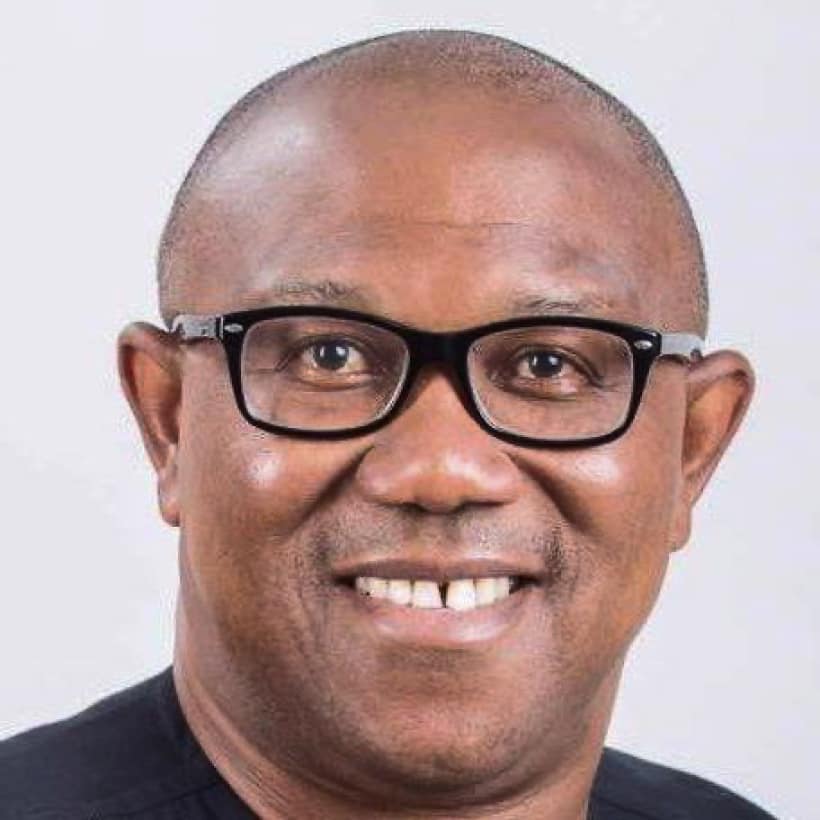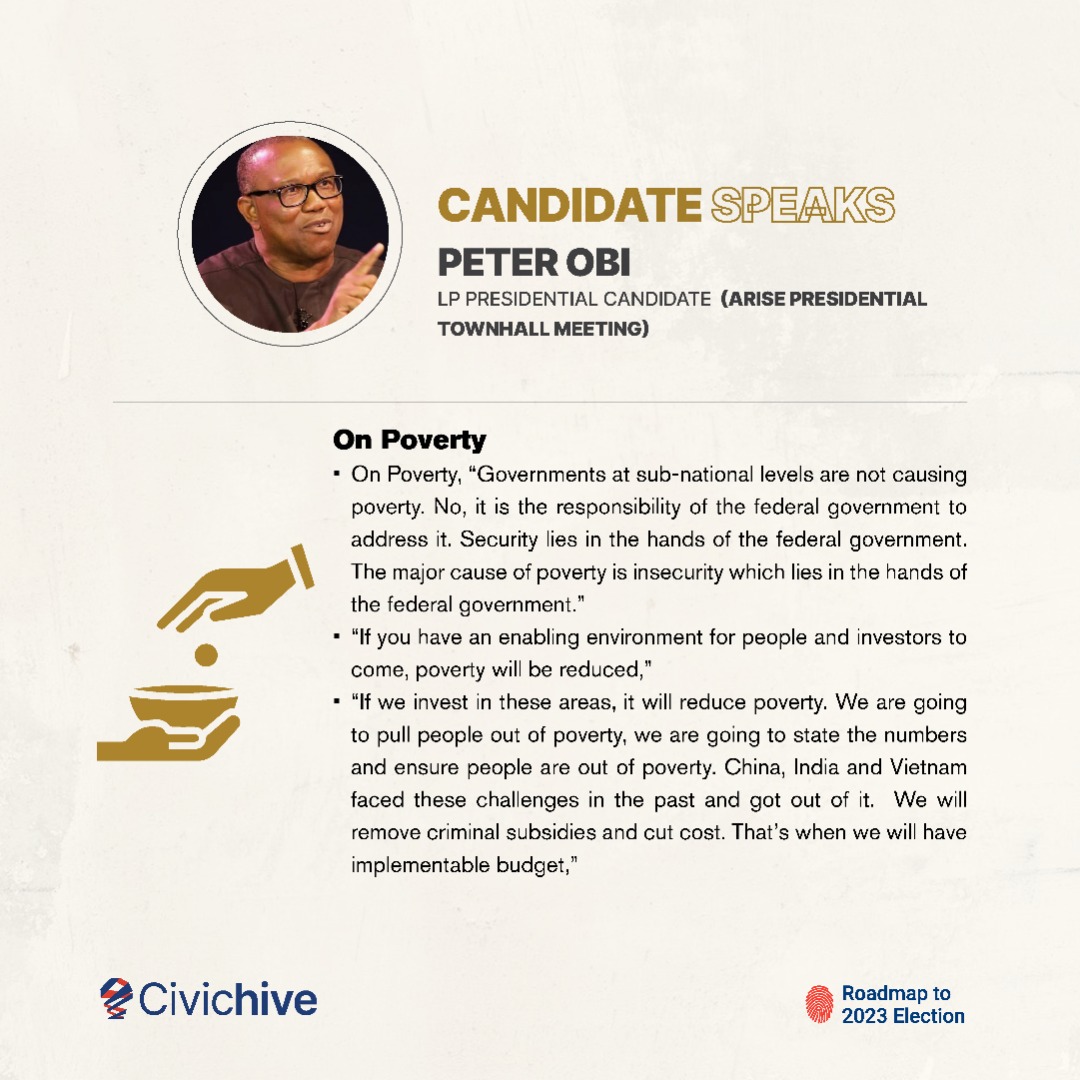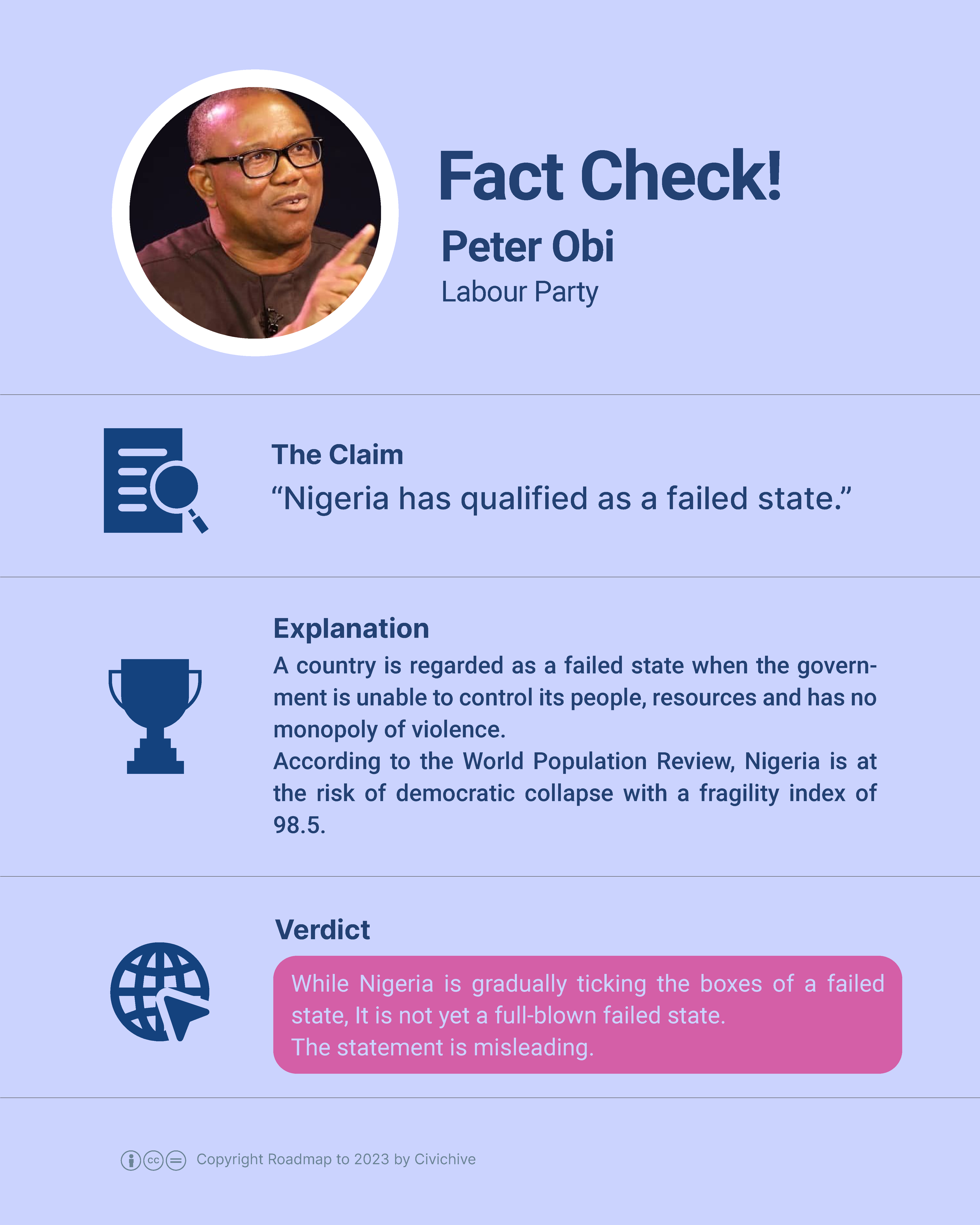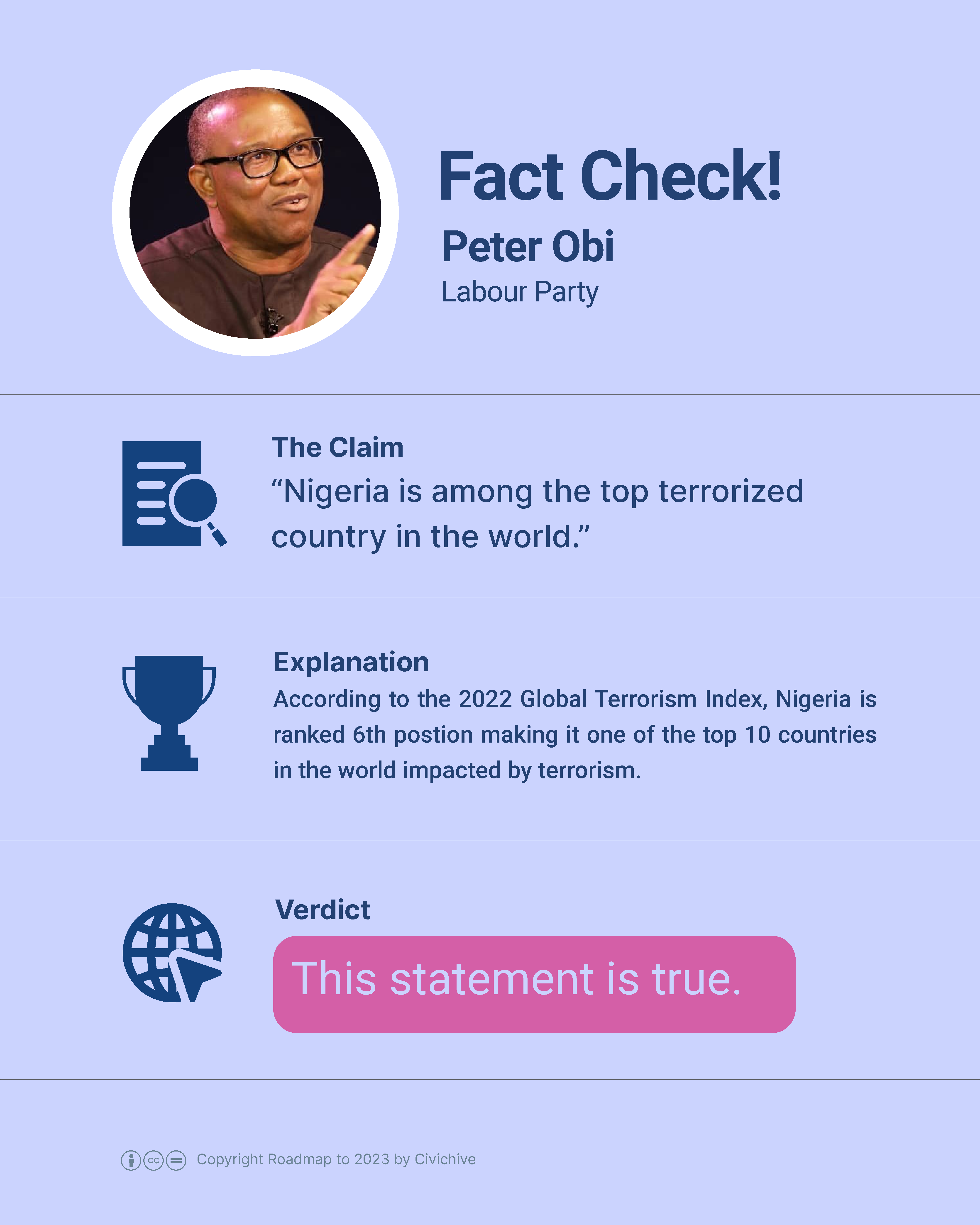Candidate Speaks

Peter Gregory Obi
Political Party: Labour Party (LP)Alma Mater: University of Nigeria
Occupation: Businessman and Politician
Age: 61
Presidential
Peter Gregory Obi CON (born 19 July 1961) is a Nigerian businessman and politician who served as governor of Anambra from March to November 2006, February to May 2007, and from June 2007 to March 2014. In May 2022, he became the Labour Party candidate for President of Nigeria in the 2023 presidential election.
Born in Onitsha in 1961, Obi graduated from the University of Nigeria in 1984. Afterwards, he entered business and banking, eventually rising to hold several high-ranking executive positions at banks. By the early 2000s, Obi was the chairman of Fidelity Bank before leaving the position to enter politics. Obi ran for governor in 2003, as a member of the All Progressives Grand Alliance but his main opponent was unlawfully declared victor. After three years of legal battles, Obi was declared the winner in 2006 and assumed office in March 2006.
Read More
Fact Check



Policy Document
Promises
- We will address the gaps in the legislation guiding the funding access modalities to Universal Basic Education Commission (UBEC), and the Tertiary Education Trust Fund (TETFund), to remove prevailing bottlenecks, create greater transparency and ensure increased flexibility, and optimum availability of funds required to meet the educational need of the Nigerian students whom they are meant to serve.
- Encourage and expand local R&D in universities, training centres, and workshops;
- We will introduce a mandatory “No Child left Behind” educational policy, mindful that Nigeria’s inadequate investment in the social sectors.
- The Ministry of Education will work out a Public-Private model that involves private corporations assuming funding and managerial responsibilities in a specially restructured taxation plan. This design will see some private corporations pay their taxes in the form of taking management of a school while the Ministry continues to retain ownership, set the national curriculum and manage other oversight functions. This will reduce the bottlenecks and burden of the government and ensure that education is delivered with consistent high quality.
- We will provide health insurance cover to 133 million poorest Nigerians including pregnant women, children, the aged and the disabled. This shall be without discrimination by socio-economic status in line with constitutional provisions as captured in Chapter 2 Section 17 (3)(d) of our constitution.
- The NHIS shall be strengthened in an efficient manner to stimulate private sector-driven health provision driven by accessibility and affordability to cover informal sector workers, the weak and the vulnerable.
- We will strive to honour Nigeria’s commitment pursuant to the 2001 African Union Abuja Declaration on HIV/AIDS, Tuberculosis and Other related Infectious Diseases, which set the target of allocating at least 15 percent of annual budgets to the improvement of the health sector in African countries.
- We will put to an end the financial resources-depleting practice of medical tourism, by supporting national teaching hospitals to specialize in niche areas of medicine, thus enjoying expeditious faculty and facilities enhancement and the attendant comparative advantage.
- We will implement the National Health Act of 2014 to the letter, and enforce the provision of its Section 46. This will be followed with further actions to improve the quality and service delivery of our health care system
- Generate innovative healthcare financing by encouraging public private healthcare sector initiatives, implementing special taxes and duty waivers.
- Build expansive and world-class infrastructure for efficient power supply, rail, road and air transportation, and pipeline network, through integrated public-private partnerships, and entrepreneurial public sector governance.
- We will address current bottlenecks in extant national policies and frameworks with the view to unlock resources for investment in critical physical and social infrastructure
- We will seek to harmonize agencies involved in the infrastructure space to address coordination failures that impede effectiveness and efficiency.
- We will explore innovative solutions to address the shortcomings in the current PPP regime
- We will integrate existing masterplans for infrastructure – gas, road, railway, urban mass transit, telecommunications (broadband), water, sewage, and electricity to create national multi-utility transport tunnels (MUT) for colocation of subsurface infrastructure development with the objective of achieving cost efficiency and a one-stop solution to right-of-way issues for accelerated infrastructure development.
- We will sign into law the National Transport Commission Act passed into law in 2018, and establish the National Transport Commission as an integrated economic regulator to make the transport sector efficient and bankable for private sector investment.
- Deal decisively with insecurity by putting a permanent end to the incessant banditry, insurgency, kidnaping and cross-border terrorism in our country today.
- Pursue proactively and deliberately policies that will implement the fundamental objectives and directive principles of state police in the constitution so as to create a secured society that reduces the social pressure for crimes and provides viable livelihood for the youths.
- Engage, support, and partner, with national and sub-national institutions and governments and network them into an integrated and reinforced onslaught against insecurity.
- Undertake institutional reforms to secure Nigerians.
- Improve the functioning and effectiveness of our security agencies particularly the police, by strengthening their civilian oversight as well as increasing their size, equipment, funding, and enhancing their professional training.
- Strengthen the Ministry of Interior, the Ministry of Police Affairs, and other regulatory and supervisory agencies to provide robust and regulatory oversight and enhance coordination and performance of statutory mandates of the security services.
- Ensure, in accordance with Section 33 of the Constitution of the Federal Republic of Nigeria (1999 as Amended), that every Nigerian life is protected at all cost.
- We believe that diversification of the economy can be attained through increasing the value addition and export potential of our agriculture and natural resources value chain. We shall achieve this through targeted export incentives and deliberate actions.
- Scaling up the development of manufacturing and processing technological capabilities across the primary products value chains where we enjoy comparative advantage;
- A monitored scheme of targeted funding to entrepreneurs taking advantage of the capacity development as outlined above.
- A radical reform of our logistics and distribution systems including ports, customs, and trade facilitation instruments to raise the competitiveness of our products and ease of doing business and reduces high trade costs that have impeded our non-oil export competitiveness.
- Strengthening of product quality support to ensure our products are of the right quality to gain market share with higher reputational advantage and branding opportunities to capture more values within AfCTA and global markets.
- Incentivising and investing in agro-cluster and industrial cluster development across our geo-resource zones to take advantage of agglomeration and scale effects.
- Shift emphasis from consumption to production by running a production centred economy that is driven by an agrarian revolution and export-oriented industrialisation.
- Aggressively pursue policies and programmes that enhance the productivity and competitiveness of all the sectors of the Nigerian economy.
- In addition to our strategic economic development plan, we have reviewed and selectively adopted critical elements in previous economic development plans in designing the bold and innovative development agenda for the new Nigeria that we shall birth.
- While acknowledging the critical situation with our food security, we will, with the required sense of urgency, optimize all the comparative advantages of our 36 states and the FCT, across all the agricultural value chains through adequate and targeted investments, policies, and programmes.
- We will grow the national economy quantitatively and qualitatively by devising programmes for re-skilling our youths to achieve a greater synergy between their skill-sets and our factor endowments.
- To ensure that the country’s economic production is equitably geared towards the net-zero emissions drive, we shall re-design incentives for present and prospective investors in the industrial sector, coupled with an apprenticeship system, to provide a ready-made source of technical expertise in the relevant areas.
- Enhance the human capital of Nigerian youths for productivity and global competitiveness through investment in world-class scholarship and research, quality healthcare, and entrepreneurship education.
- Achieving the revolution we envisage for the educational sector would require bold initiatives, including: a. Retraining, retooling and re-certification of teachers b. Incentivising industry experts to take up teaching roles in partnership with universities c. Curriculum overhaul, and d. Policy and institutional review.
- We will prioritise scaling up Nigeria’s Human Capital Index (HCI), through significant and sustainable funding for the health, education, sports, and social welfare sectors, with the imperative of improving the remuneration and conditions of service for our teachers, health workers, and administrators.
- We will introduce a mandatory “No Child left Behind” educational policy.
- Restructure the polity through effective legal and institutional reforms to entrench the rule of law, aggressively fight corruption, reduce cost of governance, and establish an honest and efficient civil service.
- We will strengthen our federalism by critically reviewing the 68 items on the exclusive list of the Federal government and moving agreed items to the concurrent list, to ensure effective public action for growth and sustainable livelihood.
- Strengthen the supreme court of the federation by increasing the number of judges and equipping them with the capacity to clear the backlog of cases and enhance the speedy adjudication of cases.
- Pursue more inclusion of our customary laws (norms and values – with respect to their compatibility with our constitution) in the contents of our formal law and in the administration of justice. For instance, reforms will be pursued for our traditional laws/rulers to be properly integrated in the formal legal/governance system.
- Pursue aggressive digitization of all judiciary, government and regulatory agencies to curb corruption and improve governance outcomes and service delivery.
- Establish theOffice of Special Counsel to investigate and prosecute every executive abuse of power and corrupt public practices that do not fall under the prosecutorial power of existing agencies or are bureaucratically concealed. We will seek constitutional amendment to exempt prosecution by the Special Counsel from the exercise of the power of Nolle Prosequi of the Attorney General of the Federation.
- Restructure the polity through effective legal and institutional reforms to entrench the rule of law, aggressively fight corruption, reduce cost of governance, and establish an honest and efficient civil service.